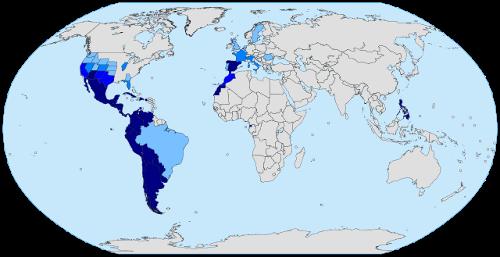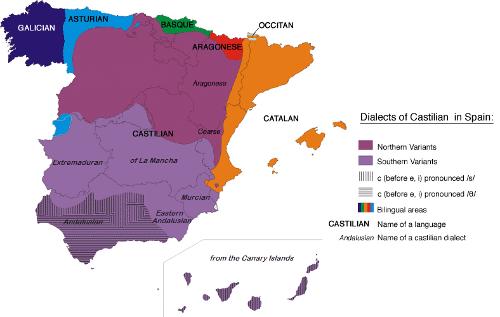SPAIN
Language

Language
Cities in SPAIN
| Barcelona | Benidorm | Bilbao |
| Blanes | Madrid | Nerja |
| Salou | Torremolinos | Valencia |
Popular destinations SPAIN
| Andalusia | Catalonia | Costa blanca |
| Costa brava | Costa del sol | El hierro |
| Formentera | Fuerteventura | Gran canaria |
| Ibiza | La gomera | La palma |
| Lanzarote | Mallorca | Menorca |
| Tenerife |
Language
 Spanish language mapPhoto: Michael Jester in the public domain
Spanish language mapPhoto: Michael Jester in the public domain
Castellano (Castilian) has been the official state language since around 1250. In other countries, Castellano is actually always called "Spanish". Castellano is a Romance language with many derivations from Latin, but also from many other languages. Spanish contains about 100 words that were brought to the peninsula by the Visigoths, among others. During the rule of the Moors, approximately 4000 words were introduced into the Spanish language. Furthermore, many words have been taken from French and Italian and more recently from English.
Examples of derivations are:
- Arabic. Alcázar. Aldea. Acequia. Alcoba
- French. monje. vinagre. menu. coqueta
- Western Gothic. guardia. ropa. tapa. espuela
- English. lider. mitin. tractor. fútbol
Castellano differs greatly from other Romance languages in some respects, especially in pronunciation. The letters of the Spanish alphabet are: a, b, c, ch, d, e, f, g, h, i, j, k, l, ll, m, n, ñ, o, p, q, r, rr, s, t, u, v, w, x, y, z.
The main dialects of Castellano are Andaluz, Leonés, Navarro, Aragonés and Asturiano.
In addition to Spain itself, Spanish is spoken in the Canary Islands and the enclaves of Melilla and Ceuta in Morocco. Furthermore, in all South American countries except Brazil, Guyana and Suriname; all Central American countries except Belize; the Caribbean islands of Cuba, Puerto Rico and the Dominican Republic; Philippines and Equatorial Guinea. In the United States, there are large Spanish-speaking communities (30 million) in Florida and California. In total, Spanish is spoken by more than 300 million people.
 Spanish dialects mapPhoto: Stephen Shaw at the English Wikipedia CC 3.0 no changes made
Spanish dialects mapPhoto: Stephen Shaw at the English Wikipedia CC 3.0 no changes made
Important regional languages were not officially recognized until the 1978 constitution. In the Franco period it was even forbidden to speak Euskera, Gallego or Catalán.
In the Basque provinces, Basque, Vascuence or Euskera is the second official language. It is spoken on both sides of the Western Pyrenees by approximately 2.5 million people. Only a quarter of them still actually speak the language. Six deviating dialects can be distinguished and therefore a kind of standard Euskera has only been established since 1968, which is also used in official publications.
In Catalonia, Catalan or Catalán is the first official language. Catalán is a language that lies between French and Castellano and is spoken and understood by about six million people. The two main dialects of Catalán are Mallorquín and Valenciano.
Gallego or Galego is heavily influenced by Portuguese and is spoken by about 1 million people, including some in Portugal. Since Galicia is an autonomous province, all official documents are written in Spanish and Gallego.
The Gypsies or Rom normally speak Romani, a language related to Sanskrit. In Spain, Romani is mixed with Spanish and is called "Lengua Caló".
To clarify the differences between Castellano and Euskera, Gallego and Catalán, below is a sentence from the constitution about the language:
Castellano
El castellano es la lengua española oficial del Estado. Todos los españoles tienen el deber de conocerla y el derecho a usarla.
Euskera
Gaztelania da Espainiako Estatuaren hizkuntza ofiziala. Espainol guztiek jakin behar dute eta erabiltzeko eskubidea dute.
Gallego
O castelán é a lingua española oficial do Estado. Todos os españoles teñen o deber de coñecela e o dereito a usala.
Catalán
El castellà és la llengua espanyola oficial de l'Estat. Totally espanyols toes el door de conèixer-la i el dret d'usar-la.
A few words:
- English: Hey / Please / Thanks. Sorry
- Castellano: hola / por favor / gracias / perdón
- Euske: kaixo / mesedez / eskerrik asko / parkatu
- Gallego: ola / por favo / gracias / perdoa
- Catalán: hola / sisplau / gràcies / perdoni
Sources
Grabowski, J.F. / Spain
Lucent Books
Spain
Lonely Planet
CIA - World Factbook
BBC - Country Profiles
Copyright: Team The World of Info